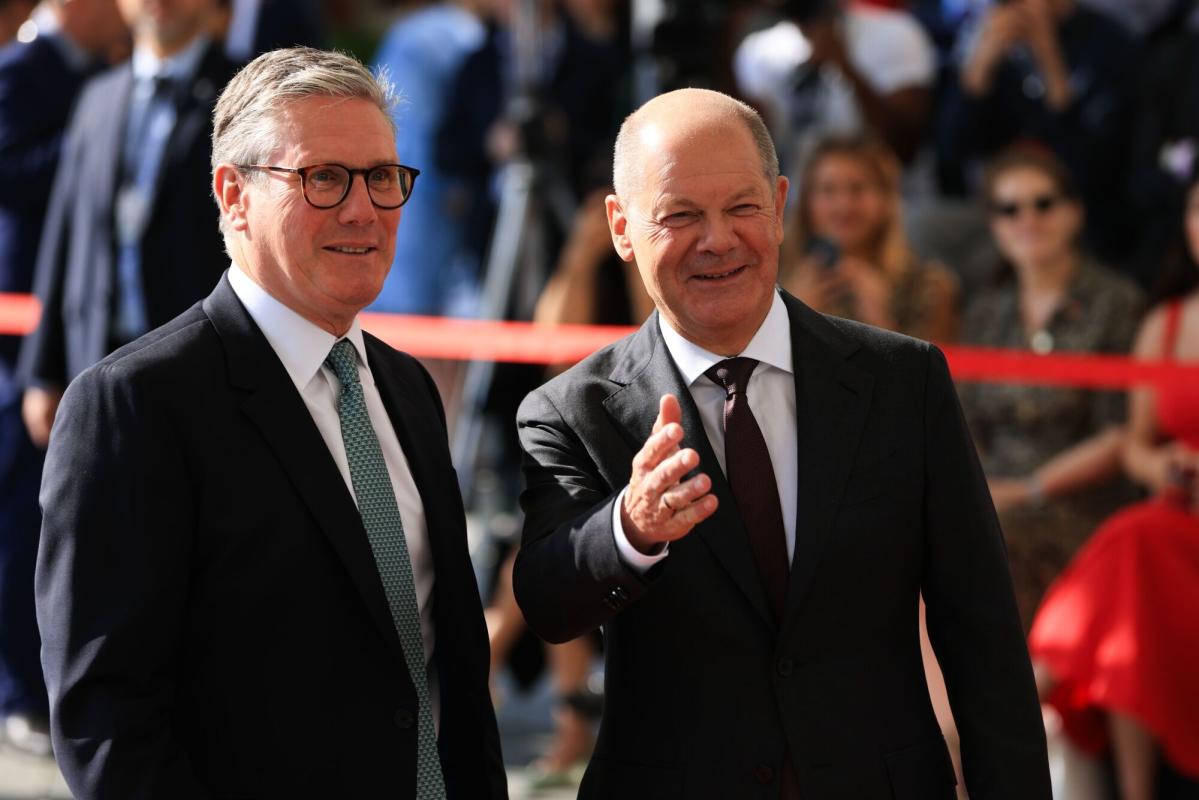
(Bloomberg) — Britain and Germany are aiming to agree on a broad cooperation treaty as part of Keir Starmer’s efforts to improve ties with European allies.
Most Read from Bloomberg
The new UK prime minister held talks Wednesday with German Chancellor Olaf Scholz in Berlin and the two nations published a joint statement outlining a proposed bilateral deal covering everything from defense and security to technology, clean energy and migration. Starmer called it “part of a wider reset grounded in a new spirit of cooperation.”
“Such a treaty has never before existed between Germany and the UK,” Scholz said alongside Starmer at the chancellery after their talks.
The two nations are also looking within the next few months to forge a narrower agreement on defense and security as an initial pillar of the pact. That would facilitate joint procurement and shared military exercises, according to government officials familiar with the planning, who asked not to be identified discussing confidential information.
While a Starmer aide described Scholz as the leader the UK prime minister’s closest to both personally and politically, the same’s not yet true of their countries — at least, not officially. Even though France and Britain have, for over a decade, coordinated their defense and security activity under the aegis of the Lancaster House treaties agreed in 2010, there’s been no equivalent framework for the Anglo-German relationship.
As one of its first foreign-policy initiatives, Starmer’s newly elected Labour government has sought to change that. Less than a week after July’s election Foreign Secretary David Lammy landed in Berlin, and his groundwork is now being followed up in the first bilateral visit of the prime minister himself.
The countries’ ambition to coordinate on defense gained fresh impetus after Russia’s 2022 invasion spurred them to rapidly turn themselves into two of the continent’s most generous donors of military aid to Ukraine.
The UK-Germany treaty is intended to come ahead of a European Union-wide security pact that Starmer’s administration wants to use to bolster defense cooperation with the wider bloc.
It’s “important to us to further develop the relationship between the European Union and Great Britain,” Scholz said at their joint press conference.
Yet the UK government remains vague about what that broader agreement would consist of and has so far given limited guidance to officials assigned with drawing-up proposals for it, people familiar with those discussions said.
Negotiations for the EU-wide agreement aren’t expected to begin until Spring 2025. Still, cooperation with Germany makes sense as a prelude to it, according to Sébastien Maillard, associate fellow at Chatham House. The bloc’s largest economy is “one of the better advocates in the EU for facilitating this closer relationship,” he said.
Starmer, who’s riding high after sweeping to office seven weeks ago with an enormous mandate, has framed the outreach to Germany in terms of his mission to boost his country’s growth rate.
He is due to meet Wednesday with Siemens Energy AG Chief Executive Officer Christian Bruch as well as Armin Papperger, the CEO of Rheinmetall AG — both of whom helm large German employers with operations in the UK.
Officials on both sides are keen to emphasize the close relationship between Starmer and Scholz and turn a page on the mutual suspicion that characterized relations between the formerly governing Conservative Party and its European partners.
The differences between the two center-left leaders are plain: Scholz heads a febrile coalition and is under pressure from the far-right Alternative for Germany party, or AfD, while Starmer enjoys his country’s biggest majority since Tony Blair’s 1997 victory.
Yet the British premier has something to learn from Scholz’s struggle to contain a threat from the populist fringes. Already a spate of anti-immigration riots stoked by online misinformation have betrayed how the far-right of British politics could, over the long-term, conspire to cause the new prime minister trouble.
When the presence of the AfD in German legislatures has made Scholz’s life difficult over the past three years, that’s an uncomfortable read-across for Starmer, who now has to contend with the advance of a party to the right of the Conservatives that recently took 14% of the vote.
In that context, the prime minister’s own allies worry whether his emphasis on stable governance will be enough to mask what is often painted by critics and political opponents as an absence of charisma.
But people who think he’s boring or weak shouldn’t underestimate him, a senior German official said of the UK prime minister — perhaps with the country’s own leader in mind.
–With assistance from Eleanor Thornber, Arne Delfs and Gregory L. White.
(Updates with Scholz, Starmer comments starting in second paragraph. An earlier version of this story was corrected to fix the spelling of Rheinmetall.)
Most Read from Bloomberg Businessweek
©2024 Bloomberg L.P.
EMEA Tribune is not involved in this news article, it is taken from our partners and or from the News Agencies. Copyright and Credit go to the News Agencies, email news@emeatribune.com Follow our WhatsApp verified Channel




